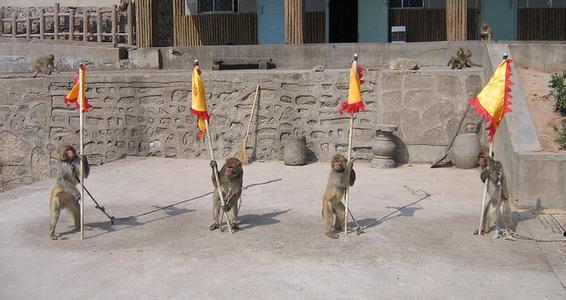Rolling five straight sevens at the craps table. Sinking eight consecutive three-point basketball shots. Making the light at the intersection every day all week.
在賭桌上連續(xù)擲出五個(gè)七點(diǎn)。投中八個(gè)連續(xù)三分球。一周七天,每天開(kāi)啟十字路口的燈光。
Such streaks are all easily within the bounds of statistical probability. But when they’re happening, people believe that they have what is often called the hot hand. Our brains are hardwired to find such patterns and meaning. And now researchers find that other primates also appear to believe in streaks.
在統(tǒng)計(jì)概率范圍內(nèi),這種連戰(zhàn)連勝都很容易做到。但當(dāng)它們發(fā)生時(shí),人們認(rèn)為它們是所謂的熱手效應(yīng)。我們的大腦習(xí)慣于找這樣的模式和意義。現(xiàn)在,研究人員發(fā)現(xiàn)其他靈長(zhǎng)類(lèi)動(dòng)物也熱衷于連戰(zhàn)連勝。
Scientists created computer games that could be played by rhesus monkeys. Some of the games were programmed to show clear patterns—that is, they were fixed. But one game gave random results.
科研人員給獼猴開(kāi)發(fā)了一些電腦游戲。有些游戲模式清晰——這些模式是固定的。而有一種游戲給出的則是隨機(jī)結(jié)果。

The monkeys played more than a thousand rounds, for rewards. They did well in the games with the obvious patterns. But in the random game, the monkeys made moves indicating that they nevertheless expected patterns to occur. The study is in the Journal of Experimental Psychology: Animal Learning and Cognition. [Tommy C. Blanchard, Adreas Wilke and Benjamin Y. Hayden, Hot-hand bias in rhesus monkeys]
為獲得獎(jiǎng)品,這些猴子玩了上千次。在有清晰模式的游戲中,它們表現(xiàn)得很好。但在隨機(jī)游戲中,猴子們就蠢蠢欲動(dòng)了,這表明它們?nèi)云诖軇?chuàng)造出一些模式來(lái)。這項(xiàng)研究在實(shí)驗(yàn)心理學(xué)期刊:動(dòng)物的學(xué)習(xí)和認(rèn)知欄目中發(fā)表。(托米·C`布蘭查德,威爾克和本杰明·Y·海登,論獼猴的熱手效應(yīng)偏好)
Evolution clearly favors the ability to find patterns—foraging for food and noticing where bunches of fruits occur is a great survival tool. But believing in a hot hand, especially in casinos, can make monkeys out of all of us.
顯然,尋求模式的能力更順應(yīng)進(jìn)化的需要——覓食或注意哪些地方可以找到大量的水果是一個(gè)重要的生存之道。但信仰熱手效應(yīng),尤其在賭場(chǎng)中,能使猴子在人群中脫穎而出。
譯文屬可可英語(yǔ)原創(chuàng),未經(jīng)允許,不得轉(zhuǎn)載。












